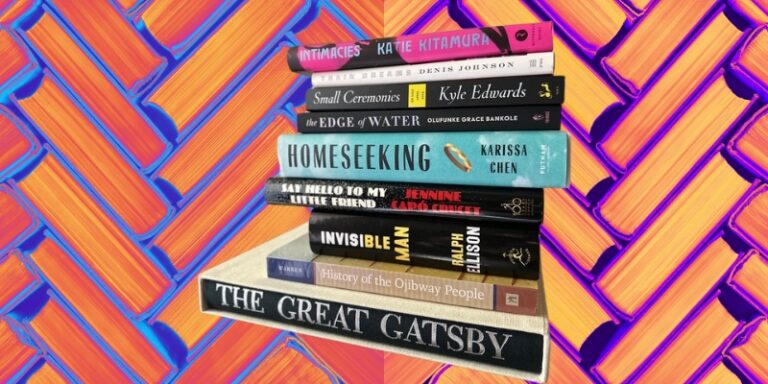The Annotated Nightstand: What Jon Hickey Is Reading Now, and Next

The American government and its white citizens have made it a centuries-long project to destroy these tribes through violent physical and cultural genocide most explicit in massacres and “Indian schools” of the past through the more quiet and insidious methods today. One of the most painful legacies of this violence is the shrinking numbers of tribal members, fewer people to pass down their hard-earned knowledge. (Worldwide, Indigenous languages go extinct at a rate of one every forty days.)
This dwindling of people and their intelligences puts tribes in a painful bind—they need their population to rise if there is any chance of survival. But, because they are vulnerable, people inevitably emerge from the woodwork to lay claim to that which they have no right. Perhaps this consigns them some sort of cultural capital (á la Rachel Dolezal), or they find a means to exploit tribes through bureaucracy, or they take a slice of the financial pie allocated only to tribal members.
Many tribes depend on blood quantum, a system developed by the same people who tried to destroy them entirely. Considering the real and growing danger of cultural annihilation, many contemporary Indigenous writers are contending with the issues circling around who, exactly, can lay claim to their communities. (I quote Morgan Talty on this in a previous post, poet Kenzie Allen speaks to it powerfully in an interview.)
Jon Hickey looks at the issues surrounding Indigenous identity and sovereignty in his novel Big Chief, a political thriller in the days leading up to a locally high-stakes election. There are figures that, while nuanced, give space to scrutinize age-old concerns. There’s the white patriarch who has taken up the markers of Indigeneity (hair, dress, wife, artifacts, hobbies), and has taken it upon himself to guide and impart wisdom to the younger generation of Indigenous people, including our protagonist.
That protagonist, Mitch Caddo, craves that wisdom and the direction the man might provide. Mitch is the child of a Anishinaabe mother and white man who skipped out early. He spends some of his childhood on the reservation, eventually gets an ivy league law degree, then comes back. We find him working for a childhood friend who helped rough up the bullies who hounded Mitch with abandon: Mack Beck, the Tribal President.
While Mitch feels like he’s more on the periphery of the world, Mack rests easily within it. “Mack and I need each other,” Mitch says at one point, “I’m the substance, he’s the look.” Through this position of power by proxy to Mack, Mitch reaches toward a sense of belonging and self. But this is all thrown into question by the looming election, Mack’s questionable actions (banishments of tribal members) and Mitch’s just-as-questionable methods (sowing lies on burner Facebook accounts).
Kirkus writes in its starred review, “Keeping the timeframe tight—the story runs from Thanksgiving to the election the following Tuesday—escalates the intensity of a story that includes a plane crash, a community riot, hovering FBI agents, and a police department that’s much too comfortable using military surplus equipment.”
Hickey tells us about his to-read pile, “There’s a little of everything here—some research for the next book, some all-time inspiration to keep me going (Invisible Man, Train Dreams), and some exciting new fiction. I’m fortunate to know so many writers I admire for their brilliant stories, and this is just a tiny sample.”
*

Katie Kitamura, Intimacies
“Here is an unequivocal truth: no one will ever be as smart as Katie Kitamura. And we’re better off for it,” writes Greg Mania at BOMB, “otherwise we would not be able to relish in the distinct glow that comes from reading, watching, and listening to her.”
Mania goes on to interview Kitamura about Intimacies. She says,
I’ve always been interested in characters who speak the words of other people—whether it’s translators, interpreters, or actors. The notion of language passing through these people is formally interesting to me. But it’s more than a formal interest. There are a lot of repercussions for characters and people in this position (and I think the position of the writer, or at least a fiction writer, is not entirely dissimilar). What are the psychological and ethical repercussions of allowing yourself to be a vessel for language?

Denis Johnson, Train Dreams
Alan Warner writes of Train Dreams in The Guardian,
The novel fulfils the duties of historical fiction but, characteristically, Train Dreams releases a lurking grotesquery. As always, main and peripheral characters are magically conjured from a few deeply considered, gruff sentences: “I worked on a peak outside Bisbee, Arizona, where we were only eleven or twelve miles from the sun. It was a hundred and sixteen degrees on the thermometer, and every degree was a foot long. And that was in the shade. And there weren’t no shade.”
Grainier is everyman yet no man; essentially an orphan, with conflicting versions of his origins. The landmarks of his tough existence include the attempted execution of a storeroom thief, who seems to put a curse on him; a man shot by his own dog; the childhood discovery of a fatally injured railway hobo: “Been all over this country. Canada, too. Never a hundred yards from these rails and ties.” Young Grainier hands him his final drink in an old boot.

Kyle Edwards, Small Ceremonies
“Edwards’ spirited debut follows a group of Native hockey players in Winnipeg over the course of what might be their high school program’s last season,” begins the Publishers Weekly review of the recently published memoir.
Tomahawk “Tommy” Shields bets his friend and teammate Clinton Whiteway that he’ll make it through the whole season without getting knocked down by an opponent….The propulsive narrative toggles between several other characters’ perspectives, among them a journalist investigating accusations of racism behind the league’s decision to axe the school’s team and a mixed-race star player whose lineage is called into question by opposing players during a tournament. Edwards excels at describing how the Native characters face challenges both personal and structural as the novel barrels toward the season’s tragic final match.

Olufunke Grace Bankole, The Edge of Water
In an interview with Jules Fitz Gerald at Chicago Review of Books, Bankole states,
I don’t come from an MFA background, so if there’s a way to write a novel, I didn’t really know! I just thought if I told it from point A to point B, linearly, I didn’t think it would be as interesting for me. I wanted it to be layered. The layers for me also speak to the complexity of the intersections of Nigerian, African, Christian, Yoruba cultures, first-generation, being a woman, being a young girl, all the ways that the stories that we tell at different stages of life, within different communities, are varied….
One of my mentors years ago said to me, “You know, ‘novel’ means new, do it differently.” And that’s what I really love about the multi-perspective novel, or any novel—to ask, how can I do it differently in a way that’s interesting, that’s fun, even when telling a difficult story.

Karissa Chen, Homeseeking
“It’s 1947 Shanghai, in a longtang at dawn,” writes Kayla Maiuri in the Times.
A night-soil man empties latrines while a porridge peddler announces her goods in song. Nearby, the childhood sweethearts Suchi and Haiwen lie in their respective homes. Suchi’s suffering a nightmare that Haiwen has forgotten her. Haiwen, meanwhile, stirs in bed. Civil war rages in China, and he’s enlisted in the Nationalist Army.
It’s the last morning he’ll wake in his house. Suchi, he’s certain, will always be in his life; what remains unclear is when he will see her next. So begins Karissa Chen’s poignant debut, Homeseeking, a nations- and decades-spanning novel of two lovers separated by the forces of history.

Jennine Capó Crucet, Say Hello to My Little Friend
“I went off to college and found out that Scarface was kind of a touchstone for folks about what Miami was and who Cuban Americans were, and I found that deeply troubling,” Capó Crucet explains in an interview on NPR. “Al Pacino’s accent, for instance, doesn’t sound even remotely Spanish or Cuban to our ears, right? So I—that’s part of what the book takes up is sort of pointing out all the places where the movie is very silly and playfully engage with the film that way.”
Sascha Pfieffer, the person conducting the interview, then asks Capó Crucet,
Let’s talk about Lolita. As you said, she’s a whale, an orca. She’s been living for decades, tragically, in a cramped tank at a Miami aquarium. We also learn what she’s thinking as she swims around, and basically, she’s trying not to lose her mind. What did you want to do by making a whale a central character?
On its face, it’s a bit of a silly question (why do any characters exist?). I adore Capó Crucet for her answer: “I don’t know what I wanted to do…I think she sort of emerged.”

Ralph Ellison, Invisible Man
What new thing can I tell you about this book that feels like it will never stop humming, a tuning fork for America? Well, when I finally read Invisible Man of my own accord, I was angry no one in all my college and graduate education—which was many years at that point—had ever assigned it to me to read! By the first paragraph of the doorstop, it is clear there are few pieces of American literature as important as Invisible Man.
But, for this annotation, I did find something that was news to me. An article on the Pulitzer website bears the shocking the subtitle: “While many critics recognized its quality when it came out in 1952, a Pulitzer Fiction juror went out of his way to trash the book” under which they give the shameful account. (I suppose to move on you first has to chuck the skeletons out of your closet.)
They conclude the piece with quotations from contemporaneous reviews of Invisible Man. I particularly love this from Wright Morris in the New York Times Book Review: “The author sells no phony forgiveness. He asks none himself. It is a resolutely honest, tormented, profoundly American book.”

William W. Warren, History of the Ojibway People
The jacket copy for this book from the 1980s states,
William W. Warren’s History of the Ojibway People has long been recognized as a classic source on Ojibwe History and culture. Warren, the son of an Ojibwe woman, wrote his history in the hope of saving traditional stories for posterity even as he presented to the American public a sympathetic view of a people he believed were fast disappearing under the onslaught of a corrupt frontier population.
He collected firsthand descriptions and stories from relatives, tribal leaders, and acquaintances and transcribed this oral history in terms that nineteenth-century whites could understand, focusing on warfare, tribal organizations, and political leaders.

F. Scott Fitzgerald, The Great Gatsby (facsimile)
This is the first I’m learning of this lovely publisher of manuscripts, SP Books (they also have Truman Capote’s In Cold Blood and Virginia Woolf’s Mrs. Dalloway, among others). Looking at the facsimile of The Great Gatsby, which Fitzgerald penned at twenty-six (gulp), mostly I’m just amazed at his script. Who writes like this?? If only my scribbles were this neat.
SP Books writes of their mission,
The drafts, manuscripts and notebooks of writers are full of curiosities and unexpected surprises. There may be unpublished chapters, unknown characters and drawings scribbled in the margins. Very often there are erasures: simple crossings-out that don’t interfere with the text, neat and ordered edits throughout, irritable lines crossed out repeatedly and even angry effacements that blacken and tear the paper.
May the loving nerdiness of writers never cease.
